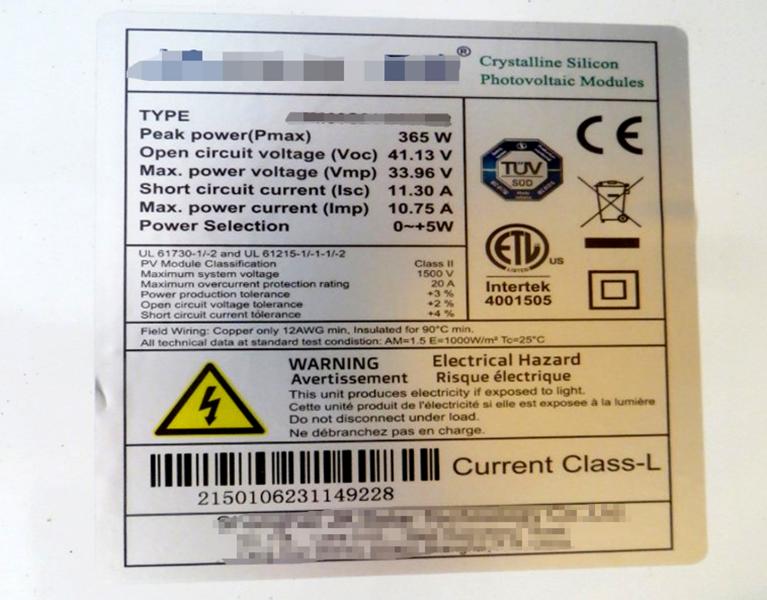BALTIMORE – Homeowners and businesses continue the popular and responsible trend of installing renewable energy solutions, such as solar technology, to save costs and to help combat global warming, but U.S. Customs and Border Protection is ensuring that a recent shipment of 1,000 imported solar panels in Baltimore won’t see the light of day.

1,000 counterfeit solar panels from
China destined to Denver.
CBP officers initially inspected and detained the shipment of 365-watt crystalline silicon photovoltaic modules from China on September 23. Officers submitted documentation and photos of the solar panels to import specialists at CBP’s Centers of Excellence and Expertise for Electronics. CBP’s Centers of Excellence and Expertise are the agency’s international trade experts. CBP import specialists then worked with trademark holders to verify the solar panels’ authenticity.
On October 27, import specialists determined that the ELT markings were applied to the solar panels without the trademark owner’s authorization and that the solar panels had not been lab certified. The Intertek ETL mark is proof of a product’s compliance to stringent North American performance and safety standards.
CBP officers seized the solar panels on November 9. The solar panels, which were destined to an address in Denver, were appraised at about $275,000 manufacturer’s suggested retail price, if authentic.
Counterfeit solar panels pose significant issues. To cut costs, they are generally constructed of substandard parts, including wiring, silicon, glass and support framing, and may not be properly weatherized. This substandard construction may result in reduced or zero power generation or premature system failure and it poses electrocution and fire hazard risks. Counterfeit solar panels also possess empty warranties and disqualify consumers and businesses from receiving solar power rebates and incentives.

certification marking, but were not certified.
“The fact that these solar panels displayed a counterfeit safety certification marking presented a very real and a very serious concern to the health and safety of American consumers, and so it was a great interception by our dedicated Customs and Border Protection officers,” said Marc Calixte, CBP’s Acting Area Port Director for the Port of Baltimore. “CBP remains committed to protecting consumers by intercepting potentially harmful goods, and by shining a light on the dangers posed by counterfeit and pirated products.”
CBP protects businesses and consumers every day through an aggressive Intellectual Property Rights (IPR) enforcement program.
During fiscal year 2020, CBP reported 26,503 counterfeit goods seizures worth an estimated manufacturer’s suggested retail price (MSRP) of over $1.3 billion, in the goods were authentic. That comes out to about $3.6 million in counterfeit goods seizures every day. Read CBP’s Intellectual Property Seizure Report for more Fiscal Year 2020 IPR stats and analysis.
CBP's border security mission is led at ports of entry by CBP officers from the Office of Field Operations.
CBP officers screen international travelers and cargo and search for illicit narcotics, unreported currency, weapons, counterfeit consumer goods, prohibited agriculture, and other illicit products that could potentially harm the American public, U.S. businesses, and our nation’s safety and economic vitality. Learn more what CBP accomplished during "A Typical Day" in 2020.
Please visit CBP Ports of Entry to learn more about how CBP’s Office of Field Operations secures our nation’s borders.

